

PowerPoint Doesn’t Suck; 10 Ideas To Make it Great. I have often heard of people saying, “we shouldn’t just keep teaching our kids PowerPoint anymore”‘ as if it is some terrible technology.
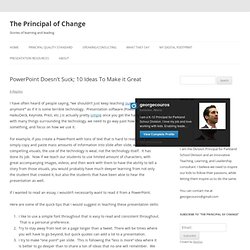
Presentation software (PowerPoint, HaikuDeck, Keynote, Prezi, etc.) is actually pretty simple once you get the hang of it, but as with many things surrounding the technology, we need to go way past how to create something, and focus on how we use it. For example, if you create a PowerPoint with tons of text that is hard to read, and you simply copy and paste mass amounts of information into slide after slide, with no compelling visuals, the use of the technology is weal, not the technology itself.
The Fiftysomething Diet. Weight-loss programs abound.
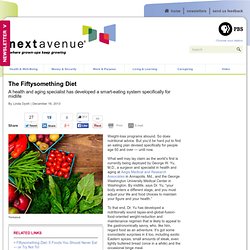
So does nutritional advice. But you’d be hard put to find an eating plan devised specifically for people age 50 and over — until now. What well may lay claim as the world’s first is currently being deployed by George W. Yu, M.D., a surgeon and specialist in health and aging at Aegis Medical and Research Associates in Annapolis, Md., and the George Washington University Medical Center in Washington. By midlife, says Dr. The New Teacher's Guide to Creating Lesson Plans.
Even if you had plenty of practice writing lessons during your teacher training, it's hard to be prepared for the avalanche of lesson planning you'll have to do once your first year of teaching begins.
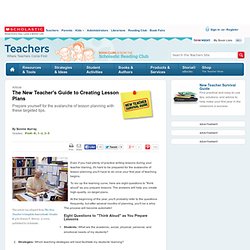
To rev up the learning curve, here are eight questions to "think aloud" as you prepare lessons. The answers will help you create high-quality, on-target plans. At the beginning of the year, you'll probably refer to the questions frequently, but after several months of planning, you'll be a whiz. The process will become automatic! 10 Great Lesson Planning Templates and Resources. Recently I wrote about ways to learn through writing lesson plans.
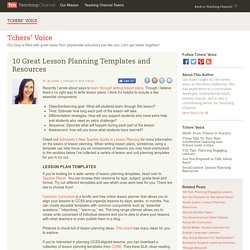
Though I believe there’s no right way to write lesson plans, I think it’s helpful to include a few essential components: Objective/learning goal: What will students learn through this lesson? The New Teacher's Guide to Creating Lesson Plans. Even if you had plenty of practice writing lessons during your teacher training, it's hard to be prepared for the avalanche of lesson planning you'll have to do once your first year of teaching begins.
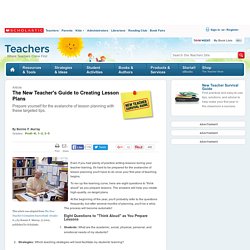
To rev up the learning curve, here are eight questions to "think aloud" as you prepare lessons. The answers will help you create high-quality, on-target plans. At the beginning of the year, you'll probably refer to the questions frequently, but after several months of planning, you'll be a whiz. The process will become automatic! Eight Questions to "Think Aloud" as You Prepare Lessons. Bell Ringer Exercises. Because of pressure to teach bell-to-bell -- the pedagogical equivalent of force-feeding geese to make foie gras -- many classrooms now start with bell work, short exercises that students complete while the instructor attends to attendance and other administrative chores.
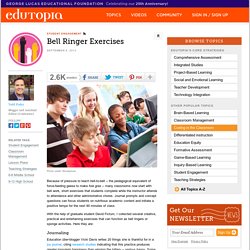
Journal prompts and concept questions can focus students on nutritious academic content and initiate a positive tempo for the next 90 minutes of class. With the help of graduate student David Fictum, I collected several creative, practical and entertaining exercises that can function as bell ringers or sponge activities. Here they are: Journaling Education über-blogger Vicki Davis writes 20 things she is thankful for in a joy journal, citing research studies indicating that this practice produces greater long-term happiness than winning the lottery -- serious happy.
Lateral Thinking Brain Food lists number and logic puzzles. Situation: A man marries 20 women in his village but isn't charged with polygamy. Pop Culture. 5 Ways to Make Class Discussions More Exciting. Classroom discussions have been a staple of teaching forever, beginning with Socrates.
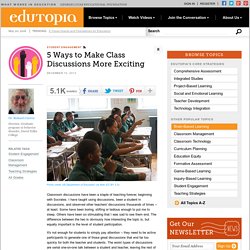
I have taught using discussions, been a student in discussions, and observed other teachers' discussions thousands of times -- at least. Some have been boring, stifling or tedious enough to put me to sleep. Tip of the Week—August 9, 2013. Someone once told us that goals should be overhead but not out of reach.
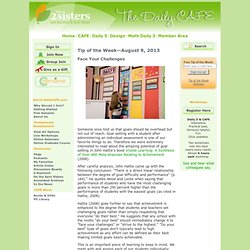
Goal setting with a student after administering an individual assessment is one of our favorite things to do. Therefore we were extremely interested to read about the amazing potential of goal setting in John Hattie's book Visible Learning: A Synthesis of Over 800 Meta-Analyses Relating to Achievement After careful analysis, John Hattie came up with the following conclusion: "There is a direct linear relationship between the degree of goal difficulty and performance" (p. 164). " He quotes Wood and Locke when saying that performance of students who have the most challenging goals is more than 250 percent higher than the performance of students with the easiest goals (as cited in Hattie, 2008). SmartBlog on Education - Resources to use when teaching in a low-income school - SmartBrief, Inc. SmartBlogs SmartBlogs. When teaching at a public school in New Orleans where more than 80% of my students received free or reduce-priced lunches, I realized quickly that my school could only provide so much assistance.
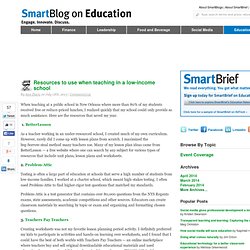
Here are the resources that saved my year. 1. BetterLesson As a teacher working in an under-resourced school, I created much of my own curriculum. Free K-12 Lesson Plans, materials and resources. Make the last weeks of school count. I remember from my days in New Hampshire that spring brought mud season, complete with bumpy frost heaves rippling across rural roads as the ground thawed.
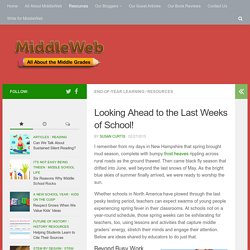
Then came black fly season that drifted into June, well beyond the last snows of May. As the bright blue skies of summer finally arrived, we were ready to worship the sun. Whether schools in North America have plowed through the last pesky testing period, teachers can expect swarms of young people experiencing spring fever in their classrooms. At schools not on a year-round schedule, those spring weeks can be exhilarating for teachers, too, using lessons and activities that capture middle graders’ energy, stretch their minds and engage their attention.
Below are ideas shared by educators to do just that. Beyond Busy Work Cossondra George, a veteran teacher at Newberry Middle School in Michigan, suggested in an Education Week Teacher post that teachers finish the school year not with a slow glide but with a strong climb. Spring Projects. Celebrating the End of the School Year. Anti-Bullying PSA Project [LESSON]
Insert the name of the lesson plan here. - Replace Your Textbook with QR codes. 0 Comments January 15, 2013 By: Harry G. Tuttle Jan 14 Written by: 1/14/2013 4:52 PM Many teachers dislike their textbooks. School districts, schools, teams or individual teachers now have a choice. Edublogs Teacher Challenges. Using digital tools to make a difference SmartBlogs. Quick question: If you wanted to make a difference in the world when you were a kid, how did you do it? For me, “making a difference” meant setting up a lemonade stand at the end of the driveway and selling Dixie cups full of sweet goodness to raise money that I would send off to the causes that I cared about. And while I really enjoyed the entire process, I didn’t make significant change in the world. Teaching Ahead: A Roundtable - Serving Low-Income Students Archives. Teaching War: Making History Relevant (Highlight Video) Teacher: Today, we're going to start our study of nuclear weapons, and atoms, and chemistry by giving a little context to why some of this science-y stuff is important to study about.
Narrator: A bold experiment in education is underway at Ascend School in the Fruitvale neighborhood of Oakland, California. Elena: So I'd like you to write down your feelings and thoughts that you have as you look at each of those photos. Ripped from the Headlines: How to Turn Current Events into Real-World Projects. When the Deepwater Horizon oil well exploded in the Gulf of Mexico earlier this year, teachers across the country recognized an opportunity to bring real-world applications of math and science into their classrooms. For Authentic Learning, Start With Real Problems. We’ve asked the education writer Suzie Boss to do a series of guest lessons for us about using The Times Fixes blog, which explores solutions to major social problems, as inspiration for designing real-world projects for schools. Response to Intervention « Smart Kids With LD.
By Matthew Saleh, J.D., M.S. Instructional Coaching - Instructional Coaching - Tools for Instructional Coaches. Presentation%20FINAL%20DRAFT. 8 first day of school activities. @Scholastic.